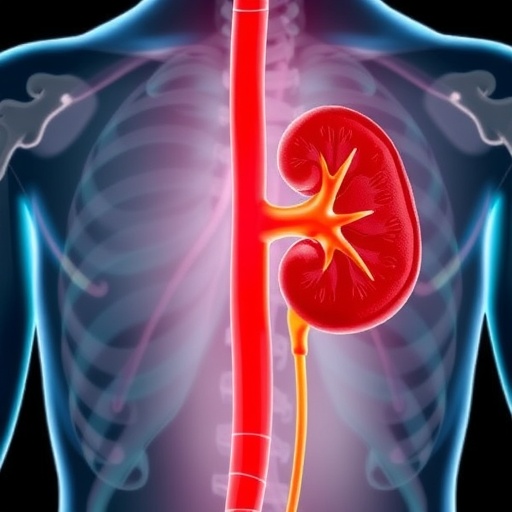In recent years, the field of organ transplantation has witnessed remarkable advancements, particularly in the procurement of organs from donors who have experienced circulatory death. This evolving practice raises important questions about the viability and outcomes of such transplants, especially when the donors also present with acute kidney injury (AKI). A systematic review sheds light on these crucial aspects, offering new insights into the short- and long-term outcomes following kidney transplant procedures from such donors.
Acute kidney injury is characterized by a rapid decline in kidney function, an event that can complicate the organ donation process. This condition occurs frequently in critically ill patients, making it a common challenge for transplant surgeons. However, with the increasing demand for donor organs and the shortage of suitable candidates, the potential of using kidneys from donors after circulatory death with AKI has gained traction. The systematic review conducted by Trachsel et al. provides extensive data regarding the outcomes associated with this practice.
The findings from the review demonstrate that while kidneys transplanted from donors who experienced acute kidney injury may exhibit certain initial complications, the long-term survival rates of recipients can still be promising. The study analyzes various factors that contribute to the success of these transplant procedures, emphasizing the importance of careful patient selection and management before and during the transplantation process. This offers a beacon of hope for patients on waiting lists, many of whom suffer from end-stage renal disease, desperately seeking viable transplant options.
Moreover, the research indicates that the kidneys from circulatory death donors with AKI can result in functional outcomes comparable to those from standard criteria donors under specific conditions. The authors argue that optimizing donor management, along with proper recipient selection, is paramount. Data analyzed in the systematic review suggests that with adequate pre-transplant assessments and post-operative care, transplant centers can significantly improve recipient outcomes, turning what was once seen as a limited option into an increasingly viable pathway.
Vigilance in monitoring both the physiological and biochemical parameters of kidney function in recipients is underscored throughout the study. The authors advocate for proactive approaches to mitigate the risks associated with these transplants, such as implementing advanced immunosuppressive therapies, using novel biomarkers to assess kidney function, and establishing post-operative follow-up protocols that can significantly enhance patient outcomes.
The review also addresses the ethical considerations surrounding organ procurement from donors after circulatory death. With critical implications for both medical ethics and transplant policy, the use of organs from this donor category raises philosophical questions about the definition of death and the potential for compromising patient outcomes. The authors highlight the necessity for ongoing dialogue within the medical community to ensure that practices align with ethical standards and the principles of beneficence and non-maleficence.
An integral aspect of the transplantation process involves communication among various medical teams, including intensive care physicians, transplant surgeons, and nephrologists. The systematic review emphasizes that a unified approach to care can lead to better outcomes. The collaboration among specialists is crucial when determining eligibility criteria and refining techniques to retrieve and subsequently transport kidneys that have been impacted by acute kidney injury.
In terms of post-operative outcomes, the review outlines factors that can influence transplant success rates, such as the use of dual organ retrieval techniques where both liver and kidney are sourced from the same donor. This strategy may enhance overall organ quality and function, thereby improving outcomes for patients receiving these transplanted organs. This innovative methodology presents an opportunity for transplant programs to maximize the utility of available organs, ultimately saving more lives.
Moreover, the review does not shy away from discussing the logistical challenges faced by transplant centers. The timing of organ retrieval, the preparation of donor kidneys, and the management of recipients post-transplant are all critical processes that can significantly impact patient outcomes. As the demand for transplantable organs continues to escalate, innovative solutions and strategies must be implemented to address these challenges effectively.
The psychological impact on recipients of kidneys sourced from donors post-circulatory death, coupled with acute kidney injury, cannot be understated. Education and support systems for patients receiving these organs can significantly enhance their overall experience and recovery journey. Offering comprehensive counseling services to address the emotional and psychological ramifications of such transplants is key, helping recipients to navigate the complexities of their new reality post-surgery.
Ultimately, the review highlights the transformative potential of utilizing organs from donors who have suffered circulatory death with acute kidney injury. The ongoing evolution of this practice underscores a commitment to addressing the organ donation crisis while ensuring the safety and well-being of transplant recipients. The findings stress that with the right conditions and attention from medical teams, these donations can lead to meaningful improvements in the lives of patients suffering from kidney disease.
As the organized community of transplant professionals continues to explore the possibilities of expanding the donor pool, it is clear that additional research and collaborative efforts will be essential. The ever-evolving landscape of transplant medicine demands continued investigation into the pathways for enhancing donor organ quality, optimizing surgical techniques, and ultimately improving patient outcomes.
In conclusion, the systematic review provided by Trachsel et al. serves as an essential resource in understanding the complex interplay between organ donation, acute kidney injury, and transplant success. As advancements in medical science continue to unfold, the ability to harness organs from circulatory death donors affected by acute kidney injury may pave the way for novel strategies that will define the future landscape of kidney transplantation.
Subject of Research: Outcomes of kidney transplants from donors after circulatory death with acute kidney injury.
Article Title: Outcomes of Kidney Transplants from Donors after Circulatory Death with Acute Kidney Injury: A Systematic Review.
Article References:
Trachsel, C., Kalt, F., Jonas, J.P. et al. Outcomes of Kidney Transplants from Donors after Circulatory Death with Acute Kidney Injury: A Systematic Review.
Curr Transpl Rep 12, 40 (2025). https://doi.org/10.1007/s40472-025-00496-2
Image Credits: AI Generated
DOI: 10.1007/s40472-025-00496-2
Keywords: Kidney transplantation, acute kidney injury, circulatory death, organ donation, recipient outcomes.




